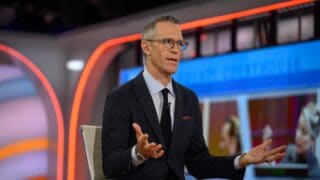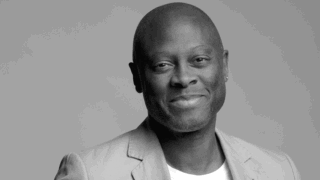The Lavin Agency Speakers Bureau
A speakers bureau that represents the best original thinkers,
writers, and doers for speaking engagements.
A speakers bureau that represents the best original thinkers,
writers, and doers for speaking engagements.
AI can help us flourish creatively and collaboratively—if we dare.
Every organization needs to know how to use AI to augment their company culture and creative processes. There is no one better equipped than Douglas Rushkoff to lead the way. A world-renowned visionary and futurist named one of the world’s 10 most influential thinkers by MIT, Douglas has spent three decades thinking and writing about emerging technologies like AI, which has given him an unparalleled perspective on how to use these new tools to unleash our full human potential. With his trademark dynamism and energy, he helps leaders and organizations navigate the tech-augmented landscape ahead, showing you how to use AI to flourish creatively, bolster collaboration, and outsmart competitors—while centering human connection and solidarity.
“Douglas Rushkoff has always been a singular observer and thinker. Embedded near the epicenters of the digital revolution, he has never flinched from honestly delivering fresh, radical, humane critiques of the emerging world.”— Kurt Anderson, New York Times bestselling author of Evil Geniuses
An internationally celebrated author and documentary filmmaker, Douglas Rushkoff has spent his prolific career revealing how new media and technology are impacting culture, business, and the economy. He’s written over a dozen bestselling books and coined such concepts as “viral media” and “social currency.” He shows us how we can turn technology to work for us, advocating for human autonomy in a digital age and challenging us to create the hopeful, thriving future we want to live in. His talks are a culmination of his pioneering work, and offer a clear-eyed look at what’s to come. In an age of artificial intelligence and countless other rising technologies, his insights have never been more crucial.
In expansive and exuberantly perceptive keynotes, Douglas shows us how we can re-humanize our technology, education, and economy. In his book Team Human, which won Porchlight’s Management and Workplace Culture Book of the Year award, and his popular podcast of the same name, he shows how to reconnect people at work, home, school, in our faith practices, and even in politics. We’re a team, he says—and if we act like one, we’ll be able to regain the collaboration and solidarity we crave. His approach yields better, longer-lasting results, both for individuals and the connected communities we form together.
In his newest book, Survival of the Richest: Escape Fantasies of the Tech Billionaires—named one of Amazon’s 20 best Business and Leadership books of the year—Douglas examines how tech elites are shaping (and eroding) the world in their image, before trying to literally escape it for island bunkers, the planet Mars, and the Metaverse. This mind-blowing work of social analysis shows us that, even in the face of cynicism, a tech-dystopia, and threats to democracy, the power of collective human action is stronger than any algorithm. We don’t need an escape strategy. We can still fight for the world we want to live in.
Among his 20 books, translated into over 30 languages, are Present Shock, Program or Be Programmed, and Throwing Rocks at the Google Bus. A witty and astute media presence, Douglas has made many television, NPR, and PBS appearances, including his Frontline documentaries Generation Like, The Persuaders, and The Merchants of Cool. He is also Professor of Media Theory and Digital Economics at CUNY, a correspondent on digital business and society for CNN, a consultant to the United Nations and the State Department, a graphic novelist, and the winner of the Marshall McLuhan Award for Media Writing and the first Neil Postman Award for Career Achievement in Public Intellectual Activity.
A heartfelt thanks. You were your usual articulate, scholarly and charming self. Such a performance demands either much rehearsal, spontaneous brilliance, endless reserves to call upon, or all three: the pacing, the insights—the impact of your talk left every single person in that room talking about your charisma, and more than that, your positively Grecian powers of rhetoric. Thank you from all of us.
Princeton ProgressivesI just wanted to say thank you so much for participating yesterday. It was great to meet you and the feedback has been amazing from the audience in house and those watching the livestream (some of whom were glued to their laptops for the entire day, which is saying something!). It’s good to have such a passionate and engaging speaker to shake things up a bit.
Ellen MacArthur FoundationWe cannot begin to thank you enough for traveling all the way to Memphis to be one of our conference featured speakers. Your energy and intelligence really ignited the room and provided some very good food for thought. We sincerely appreciate your willingness to work with us to make this part of your book tour. It was a great pleasure and honor to meet you and hear your thoughts on growth and the digital economy.
Alliance for Nonprofit ExcellenceWe really can't think of a better way for the conference to have started then with your brilliant—and brilliantly hilarious—talk. Several speakers thanked me for scheduling you when I did, because no one would have wanted to follow your talk!
Case Western Reserve UniversityThe presentation was excellent. One of the best we have had. Douglas is intelligent, engaging—and visionary. The audience found him very insightful as well as entertaining. He has a casual style but it is very refreshing. And he had quite a group stay after to speak with him.
Denver University
Author of The Loop: How A.I. is Creating a World without Choices and How to Fight Back NBC News Technology Correspondent Former Editor-in-Chief of Popular Science Magazine AI Strategic Advisor to Fortune 500 Companies

Instant New York Times Bestselling Author of Empire of AI One of the Most Influential People in AI (TIME, Business Insider) Lead Designer of The Pulitzer Center's AI Spotlight Series
Expert on Time and Happiness Author of Happier Hour UCLA Professor

Founding President, PlusCo Venture Studio Former Chief Creative and Innovation Officer, Cossette

Instant New York Times Bestselling Author of Empire of AI One of the Most Influential People in AI (TIME, Business Insider) Lead Designer of The Pulitzer Center's AI Spotlight Series
Author of The Age of Cryptocurrency and Our Biggest Fight Co-Host of the Money Reimagined Podcast MIT Media Advisor

Author of The Loop: How A.I. is Creating a World without Choices and How to Fight Back NBC News Technology Correspondent Former Editor-in-Chief of Popular Science Magazine AI Strategic Advisor to Fortune 500 Companies

Founding President, PlusCo Venture Studio Former Chief Creative and Innovation Officer, Cossette

Speaker on AI and Education Executive Director of the Stanford Accelerator for Learning

#1 New York Times Bestselling Author of Grit and Situated | Pioneering Researcher on Grit, Perseverance, and the Science of Success

Nobel Prize Winner | 3rd Most Cited Economist in the World | Bestselling Co-Author of Why Nations Fail and Power and Progress

Harvard Business School Behavioral Science Professor | "40 Under 40 MBA Professor" | Author of TALK: The Science of Conversation and the Art of Being Ourselves

#1 New York Times Bestselling Co-Author of Abundance | Host of thePlain English Podcast | CBS News Contributor

#1 New York Times Bestselling Author of How the Word Is Passed and Above Ground | The Atlantic Staff Writer

To Douglas Rushkoff, Team Human is a manifesto—a fiery distillation of his most urgent thoughts on civilization and human nature. In this talk, drawn from the book which won Porchlight’s Management and Workplace Culture Book of the Year award, Douglas argues that we are essentially social creatures, and that we achieve our greatest aspirations when we work together—not apart. Today, society is threatened by a vast antihuman infrastructure that undermines our ability to connect. But Douglas will show you how we can overcome it as a team—as a company, school, church, or any other group—and in doing so, retrieve the collaborative spirit at the heart of what we do.
This talk is Douglas’s impassioned call to arms—to recognize that being human is a team sport. In his own words: “Being social may be the whole point.” Harnessing wide-ranging research on human evolution, biology, and psychology, Douglas will show your audience that when we work together, we realize greater happiness, productivity, and peace. If we can understand this fundamental truth and reassert our humanity—together—we can make the world a better place to be human.

With the meteoric rise of generative AI technologies—such as ChatGPT and DALL-E—many of us are asking big questions about artificial intelligence and where it fits into our corporate culture and creative processes. Douglas Rushkoff, bestselling author of Program or Be Programmed, argues that rather than replacing human creativity, appropriately developed AI can augment human imagination and expression. Instead of substituting for human relationships, AI can help foster collaboration and compatibility. Instead of doing students’ homework for them, AI can challenge them to do deeper analysis and dig for deeper insights.
In this engaging talk, Douglas breaks down how AI works, what it threatens if we turn to it for the wrong things, and how we can use it in ways that augment human flourishing. He draws on the entertaining stories and actionable conclusions he’s learned over his long career examining how technology changes society. With his trademark energy and thoughtfulness, Douglas argues that our companies’ future depends on our understanding of what makes humans fundamentally different from machines, and our willingness to embrace the novelty that comes from humans and AI working together toward human aims. Rather than repressing human agency, AI can unleash the creative potential of our organizations—if we dare.

We’re at a turning point in the history of technology—not because AI can give us better answers, but because it can help us ask better questions. As AI tools reshape how we work, create, and connect, we have a choice: will we use these tools to reinforce the same old systems, or to imagine something radically new?
Douglas Rushkoff—media theorist and one of the world’s 10 most influential intellectuals (MIT)—says the AI era isn’t just about faster answers. It’s about slowing down to rethink what we’re solving for in the first place.
In this provocative and inspiring talk, Douglas draws from his work with AI consulting startup Andus Labs to explore what it means to co-create with machines instead of compete with them. He shares examples from the AI innovation labs he’s helping design: spaces where teams are interrogating what their companies stand for and how these new tools might amplify their most human goals. And he introduces audiences to the idea of “generative thinking”: designing new ways of thinking and asking questions, for humans and machines alike.
Audiences will walk away with a new mindset for AI—one grounded not in automation or optimization, but in creativity, empathy, and collaboration. “These apparent AI challenges can launch different kinds of conversations,” Douglas tells Fast Company. “And then they suggest a different way of working with AI, which is not to accelerate the rate at which we develop industrial-age, easy solutions, but rather to engage in a new style of generative thinking, where we iterate questions and problems with artificial intelligence.”

Five mysterious billionaires summoned Douglas Rushkoff to a desert resort for a private talk. The topic? How to survive The Event: the societal catastrophe they know is coming. Douglas came to understand that these men were under the influence of The Mindset, a Silicon Valley–style certainty that they can break the laws of physics, economics, and morality to escape a disaster of their own making—as long as they have enough money and the right technology.
In this engaging and eye-opening talk, Douglas traces the origins of The Mindset in science and technology through its current expression in missions to Mars, island bunkers, and the Metaverse. This mind-blowing work of social analysis shows us how to transcend the landscape The Mindset created—a world alive with algorithms and intelligences actively rewarding our most selfish tendencies—and rediscover community, mutual aid, and human interdependency. Instead of changing the people, he argues, we can change the program.

When we think about making a better society, we often assume that the first step is to get people to change. But bestselling author and intellectual Douglas Rushkoff says we don’t need to “get people” to do anything—we can create a better world by recognizing the underlying assumptions behind our economy and institutions, and shifting them to work for us rather than against us.
Named one of the ten most influential intellectuals in the world by MIT, Douglas has built an enormous following by tracking how technology has changed us and our society. In this brilliant, energetic talk, he offers four steps to creating real social change, drawn from his long career chronicling and examining the rise of the digital age. He shows us how we must start by questioning the underlying assumptions of our world and our economies. Then, we have to rewrite the codes we live by, so that they serve more people and reflect our own values. Thirdly, we must learn to work as a team—making it easier for people to ask for favors, to establish rapport, and to build solidarity. Finally, we need to cultivate awe: experiencing ourselves as a part of something greater.
Douglas gives us practical ways to put each of these steps into action in our own lives and communities. Through this process, he argues, we can bring about a better world without needing to change who we are as humans. Audiences will walk away entertained, enlightened, and equipped for the work ahead.

Douglas Rushkoff has built an enormous following by examining the rise of the digital age, and how it’s fundamentally changed our world for the better (and sometimes for the worse). His vast experience, encapsulated in over a dozen bestselling books, has given him an unparalleled perspective on every issue audiences care about: from political polarization to generative AI to the rapidly changing media landscape, and everything in between.
In this fully customizable keynote, Douglas asks audiences to come up with the ten social, technological, or economic issues they find most urgent, and then weaves a single coherent talk that combines them all. He shows how each issue—any issue—is interwoven with all the others, and how they’re all part of the same story. Then he shows how this helps us find community, so we can tackle all these topics as a team. This personalized talk is a must-listen for anyone who’s interested in how the concerns we face all overlap, and how we can find a way through all of them, together. Audiences will walk away with the tools, solidarity, and hope that we need to navigate our complex landscape.